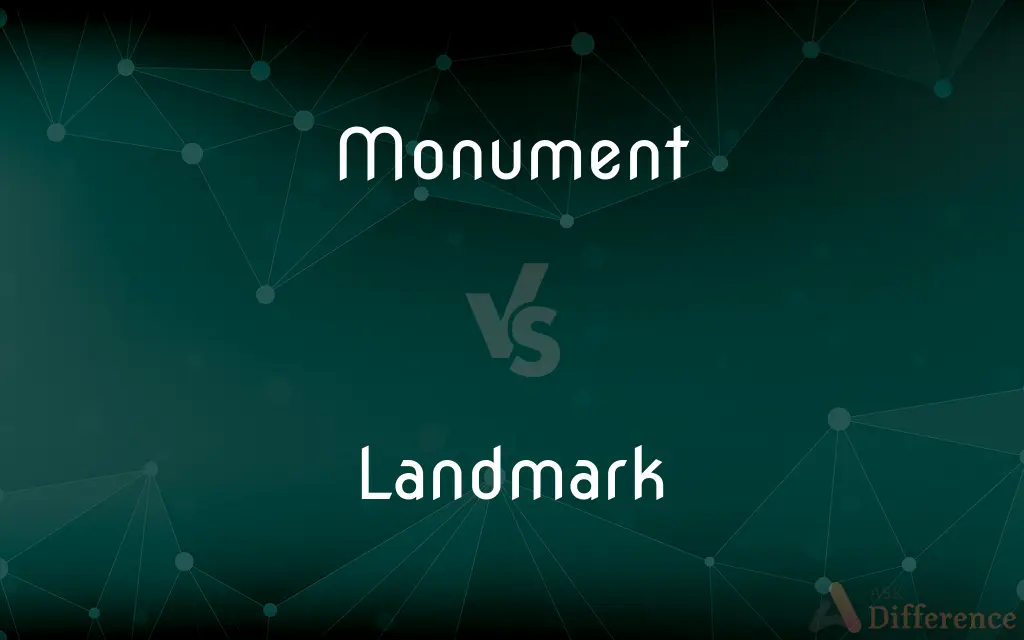Monument vs. Landmark — What's the Difference?
By Tayyaba Rehman — Updated on November 3, 2023
A monument is a structure erected to commemorate something; a landmark is a prominent feature used for navigation or identification.

Difference Between Monument and Landmark
Table of Contents
ADVERTISEMENT
Key Differences
A monument is typically a structure created to remember and honor a particular historical event or person. It is often a work of art like a statue, pillar, or building. Landmarks, on the other hand, are distinct natural or man-made features that stand out from their surroundings and are often used as reference points for navigation or to denote a location of interest.
While monuments are usually made with the intent to commemorate, landmarks gain their status through recognition and significance to a region or community. A landmark can be a monument if it has achieved notable recognition or importance, but not all monuments are landmarks. A monument's value is primarily memorial or symbolic, while a landmark serves as a point of reference or interest in an area.
Monuments often serve as sites for reflection or ceremony, related to their commemorative purposes. Landmarks do not necessarily have this function; they may be widely recognized due to their unique characteristics, location, or historical significance. Landmarks might also be used for practical purposes, such as meeting points or tourist attractions.
The significance of a monument is usually tied to a specific historical narrative or event and is often officially established. Landmarks, conversely, can obtain their status organically over time through public or cultural acknowledgment and can range from buildings to geographical features.
Monuments are often protected by law due to their cultural and historical importance. Landmarks can also be protected, especially if they hold historical value, but their recognition often extends beyond legal frameworks, embedded in the public consciousness or cultural identity of a place.
ADVERTISEMENT
Comparison Chart
Purpose
Built to commemorate or memorialize.
Recognized for historical, cultural, or navigational significance.
Nature
Often artistic or symbolic.
Can be natural or man-made, not necessarily symbolic.
Status Acquisition
Typically official designation.
Can be either official or through public recognition.
Function
Serves as a place for reflection or homage.
Serves as a navigation aid or point of interest.
Examples
The Lincoln Memorial, The Taj Mahal.
The Empire State Building, Mount Everest.
Compare with Definitions
Monument
A monument is a type of structure that was explicitly created to commemorate a person or event, or which has become relevant to a social group as a part of their remembrance of historic times or cultural heritage, due to its artistic, historical, political, technical or architectural importance. Some of the first monuments were dolmens or menhirs, megalithic constructions built for religious or funerary purposes.
Landmark
Landmarks are often used for orientation and navigation.
Tourists used the tall skyscraper as a landmark to find their hotel.
Monument
Monuments are often found in public spaces for collective remembrance.
The new monument in the park commemorates local heroes.
Landmark
A landmark can be a significant historical site.
The Alamo is a landmark remembered for Texas' independence.
Monument
A monument is a structure built to remember an important person or event.
The Washington Monument stands tall in honor of America's first president.
Landmark
A landmark may become a symbol of a particular place.
The Statue of Liberty is an iconic landmark of New York City.
Monument
Monuments are enduring symbols of historical significance.
The monument on the battlefield marked a turning point in the war.
Landmark
A landmark is a recognizable natural or artificial feature used for navigation, a feature that stands out from its near environment and is often visible from long distances. In modern use, the term can also be applied to smaller structures or features, that have become local or national symbols.
Monument
Monuments can be statues, buildings, or other artistic works.
The Martin Luther King Jr. monument is a place of inspiration and reverence.
Landmark
Landmarks are prominent features that stand out in an area.
The lighthouse has served as a coastal landmark for centuries.
Monument
A statue, building, or other structure erected to commemorate a notable person or event
A monument to Magellan is in the main square of the city
A simple stone monument marked the nearby crash site
Landmark
An object or feature of a landscape or town that is easily seen and recognized from a distance, especially one that enables someone to establish their location
The spire was once a landmark for ships sailing up the river
Monument
A structure, such as a building or sculpture, erected as a memorial.
Landmark
An event or discovery marking an important stage or turning point in something
The vaccine is a landmark in the history of preventive medicine
Monument
An inscribed marker placed at a grave; a tombstone.
Landmark
A prominent identifying feature of a landscape.
Monument
Something venerated for its enduring historic significance or association with a notable past person or thing
The architectural monuments of ancient Rome.
Traditions that are monuments to an earlier era.
Landmark
A fixed marker, such as a concrete block, that indicates a boundary line.
Monument
An outstanding enduring achievement
A translation that is a monument of scholarship.
Landmark
An event marking an important stage of development or a turning point in history.
Monument
An exceptional example
"Thousands of them wrote texts, some of them monuments of dullness" (Robert L. Heilbroner).
Landmark
A building or site with historical significance, especially one marked for preservation by a municipal or national government.
Monument
An object, such as a post or stone, fixed in the ground so as to mark a boundary or position.
Landmark
Having great import or significance
A landmark court ruling.
Monument
A structure built for commemorative or symbolic reasons, or as a memorial; a commemoration.
There is a monument on the town green to the soldiers who died in World War I.
Landmark
To accord the status of a landmark to; declare to be a landmark.
Monument
An important site owned by the community as a whole.
Landmark
(historical) An object that marks the boundary of a piece of land (usually a stone, or a tree).
Monument
An exceptional or proud achievement.
Landmark
A recognizable natural or man-made feature used for navigation.
Monument
An important burial vault or tomb.
Landmark
A notable location with historical, cultural, or geographical significance.
Monument
Any grave marker.
Landmark
A major event or discovery.
An important landmark in human history
A landmark paper in neurosurgery
A landmark ruling/case
Monument
A legal document.
Landmark
(US) To officially designate a site or building as a landmark.
Monument
A surveying reference point marked by a permanently fixed marker (a survey monument).
Landmark
A mark to designate the boundary of land; any mark or fixed object (as a marked tree, a stone, a ditch, or a heap of stones) by which the limits of a farm, a town, or other portion of territory may be known and preserved.
Monument
A pile of stones left by a prospector to claim ownership of ore etc. found in a mine.
Landmark
Any conspicuous object on land that serves as a guide; some prominent object, as a hill or steeple.
Monument
(surveying) A natural or artificial object used as a reference point.
Landmark
A structure that has special significance, such as a building with historical associations;
Monument
A surviving record.
Landmark
An event or accomplishment of great significance; as, Brown v. Board of Education was a landmark of the civil rights movement. Also used attributively, as a landmark court decision.
Monument
(transitive) To mark or memorialize with a monument.
Landmark
The position of a prominent or well-known object in a particular landscape;
The church steeple provided a convenient landmark
Monument
Something which stands, or remains, to keep in remembrance what is past; a memorial.
Of ancient British artA pleasing monument.
Our bruised arms hung up for monuments.
Landmark
An event marking a unique or important historical change of course or one on which important developments depend;
The agreement was a watershed in the history of both nations
Monument
A building, pillar, stone, or the like, erected to preserve the remembrance of a person, event, action, etc.; as, the Washington monument; the Bunker Hill monument. Also, a tomb, with memorial inscriptions.
On your family's old monumentHang mournful epitaphs, and do all ritesThat appertain unto a burial.
Landmark
A mark showing the boundary of a piece of land
Monument
A stone or other permanent object, serving to indicate a limit or to mark a boundary.
Landmark
An anatomical structure used as a point of origin in locating other anatomical structures (as in surgery) or as point from which measurements can be taken
Monument
A saying, deed, or example, worthy of record.
Acts and Monuments of these latter and perilous days.
Landmark
A landmark is a recognizable natural or artificial feature used as a reference point.
The Golden Gate Bridge is a well-known landmark in San Francisco.
Monument
A structure erected to commemorate persons or events
Monument
An important site that is marked and preserved as public property
Monument
A burial vault (usually for some famous person)
Monument
A monument serves as a lasting memorial.
Families gathered at the 9/11 Memorial Monument to pay their respects.
Common Curiosities
How does a site become a landmark?
A site becomes a landmark either through official designation or public recognition due to its significance.
What makes a landmark important?
Landmarks are important due to their navigational, historical, cultural, or symbolic significance.
Can any structure be a monument?
No, monuments are specifically built to commemorate or memorialize something or someone.
Is every monument a landmark?
Not every monument is a landmark; only those that gain significant recognition become landmarks.
Are landmarks always made by humans?
No, landmarks can also be natural features like mountains or rivers.
Do monuments have to be large?
Monuments vary in size and can range from small plaques to massive structures.
Are all monuments protected by law?
Many monuments are protected by law, especially if they are designated as historical landmarks.
Can natural features be considered monuments?
Natural features are not typically considered monuments unless altered or designated to commemorate something.
Are there international landmarks?
Yes, some landmarks are recognized internationally, like the Eiffel Tower in Paris.
What role do landmarks play in history?
Landmarks often serve as tangible links to historical events, eras, or figures.
How do landmarks affect tourism?
Landmarks often attract tourists and serve as key points of interest for visitors.
Can landmarks be removed or relocated?
Landmarks can sometimes be removed or relocated, but this is often controversial due to their significance.
Can a building be both a monument and a landmark?
Yes, a building can be both if it was built to commemorate something and also stands out as a point of reference or significance.
Can a landmark be temporary?
Some landmarks may be temporary if they are part of an event or installation.
Do monuments contribute to cultural identity?
Yes, monuments often contribute significantly to the cultural identity and heritage of a community or nation.
Share Your Discovery

Previous Comparison
Xylophone vs. Glockenspiel
Next Comparison
Affirmation vs. ConfirmationAuthor Spotlight
Written by
Tayyaba RehmanTayyaba Rehman is a distinguished writer, currently serving as a primary contributor to askdifference.com. As a researcher in semantics and etymology, Tayyaba's passion for the complexity of languages and their distinctions has found a perfect home on the platform. Tayyaba delves into the intricacies of language, distinguishing between commonly confused words and phrases, thereby providing clarity for readers worldwide.
















































